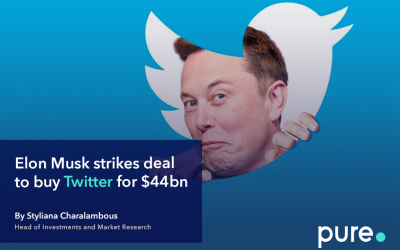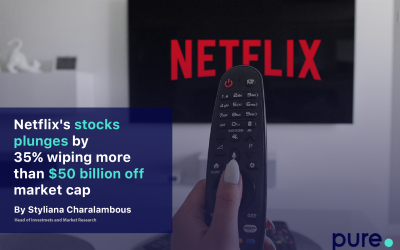The U.S. market’s first Bitcoin-linked exchange-traded fund, the ProShares Bitcoin Strategy ETF debuted Tuesday, pushing the cryptocurrency closer to the mainstream.
The ProShares Bitcoin Strategy ETF — trading under the ticker BITO — rose about 4.9% to $41.94. More than 24 million shares changed hands Tuesday, according to data compiled by Bloomberg. Because of the way the fund settles trades, net flows into or out of the product probably won’t be known until overnight on Wednesday.
What are Bitcoin ETFs?
- A bitcoin ETF mimics the price of the digital currency, allowing investors to buy into the ETF without trading bitcoin itself.
- Investing in a bitcoin ETF cuts out any issues of complex storage and security procedures required of cryptocurrency investors.
- ProShares, a provider of specialized exchange-traded products, began trading of the Bitcoin Strategy Fund on Oct. 19, 2021, marking the first Bitcoin ETF to trade in the U.S.
The bullish tone across the board follows a successful day for the first Bitcoin exchange-traded fund (ETF) in the United States, with $1 billion in volume and $550 million in assets under management after just a single trading session.
A Bitcoin ETF has been long-awaited by both the crypto community and investors on Wall Street, many of whom have argued for years that approval by regulators would open up digital currencies to more mainstream investors. The ProShares fund is based on futures contracts and was filed under mutual fund rules that SEC Chairman Gary Gensler has said provide “significant investor protections.”
It’s long been assumed that whoever received approval first could stand to reap the greatest benefits — including industry recognition as well as potentially attracting huge amounts of cash. Some analysts are already bullish on BITO’s prospects — the futures-based Bitcoin ETF could attract more than $50 billion in inflows in its first year given the hype around it, according to noted Bitcoin bull Tom Lee, co-founder of Fundstrat Global Advisors.
There are other applications for futures-based Bitcoin ETFs in the queue. Analysts are anticipating launches from issuers such as Valkyrie, whose Bitcoin Strategy exchange-traded fund could trade under the ticker BTFD.
Meanwhile, Grayscale Investments LLC and the New York Stock Exchange filed to convert the world’s biggest Bitcoin fund, ticker GBTC, into an ETF, appealing to regulators for approval just as its wildly popular vehicle is beset with competition.
Why Not Just Invest in Bitcoin?
If a bitcoin ETF merely mirrors the price of the cryptocurrency itself, why bother with the middle man? Why not just invest in bitcoin directly? There are several reasons for this. First, as indicated above, investors don’t have to bother with the security procedures associated with holding bitcoin and other cryptocurrencies. Further, there is no need to deal with cryptocurrency exchanges in the process investors can just buy and sell the ETF through traditional exchanges and markets.
There is another crucial benefit to focusing on a bitcoin ETF rather than on bitcoin itself. Because the ETF is an investment vehicle, investors would be able to short sell shares of the ETF if they believe the price of bitcoin will go down in the future. This is not something that can be done in the traditional cryptocurrency market.
You can short sell bitcoin ETF shares if you believe the price of the underlying asset will go down—an advantage you won’t find by investing in bitcoin itself.
Perhaps most importantly, though, ETFs are much better understood across the investment world than cryptocurrencies, even as digital coins and tokens become increasingly popular. An investor looking to get involved in the digital currency could focus on trading a vehicle they already understand instead of having to learn the ins and outs of something seemingly complicated.
Elon Musk strikes deal to buy Twitter for $44bn
Netflix’s stocks plunges by 35% wiping more than $50 billion off market cap
Netflix’s stocks plunges by 35% wiping more than $50 billion off market cap
Microsoft Buys Activision for $69 Billion with Eyes on Metaverse Development
Microsoft Buys Activision for $69 Billion with Eyes on Metaverse Development





